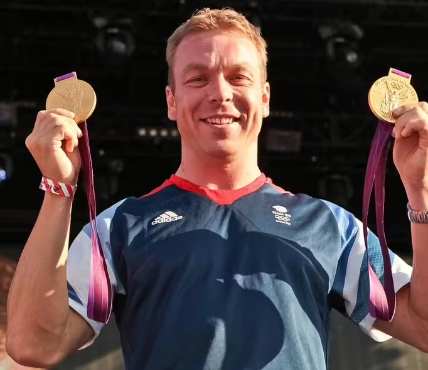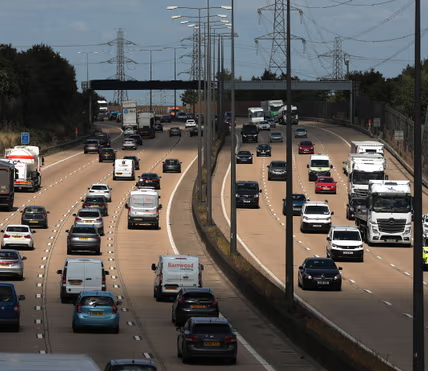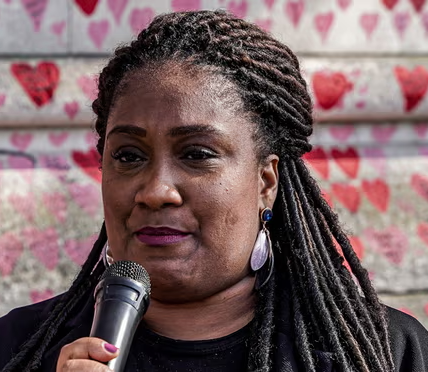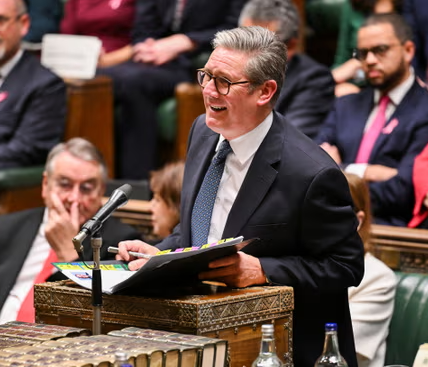Source says backstage ‘brush-by’ did not include discussion of VIP protection given to star, a decision made by Scotland Yard
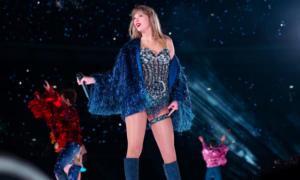
Taylor Swift performing at Wembley Stadium in August. Starmer has repaid gifts and hospitality including £2,800 for four tickets. Photograph: TAS 2024/Getty Images
Keir Starmer met Taylor Swift at one of her London concerts days after a decision was taken to grant her a “blue light” police escort, No 10 sources have confirmed.
The prime minister and his family had a 10-minute meeting with the pop megastar and her mother, Andrea, backstage at Wembley on 20 August, with the conversation covering the Southport murders, which took place at a Swift-themed holiday club.
The Guardian has been told that there was no discussion of the police motorbike convoy that had been provided for Swift and her entourage, and which Downing Street has repeatedly insisted was an operational matter for Scotland Yard.
No 10 had initially declined to comment when asked if Starmer had met the billionaire pop star when he and his family were invited on 16 August to the Wembley gig by Universal Music, but the “brush-by” was confirmed after it was reported by the Sun.
It was also reported that Swift was given convoys to the stadium for five gigs from 15 August, despite initial police reservations, with her mother negotiating arrangements directly with former No 10 chief of staff Sue Gray.
Downing Street has denied that Starmer received the free tickets as a “thank you” for the singer getting a police escort to her concerts. “I completely reject that characterisation,” his spokesperson said. “It’s ultimately up to the police to take operational decisions in relation to these big events.”
Starmer declared the tickets, worth £2,800, to the final night of the Eras tour in London in line with the parliamentary rules, but later paid them back following weeks of criticism over accepting thousands of pounds worth of freebies.
No 10 has faced repeated questions over the decision to give Swift and her entourage a police convoy by the Special Escort Group (SEG), a specialist unit of the Metropolitan police usually reserved for the royal family and senior politicians.
Downing Street says the move, which came after the pop star pulled out of three planned concerts in Vienna when police foiled a terror plot, was an operational matter for police.
However, the police decision was reportedly changed after representations from Sadiq Khan, the mayor of London, and Yvette Cooper, the home secretary, about the economic repercussions if the huge concerts were called off.
Starmer’s spokesperson did not deny that No 10 potentially had had conversations with Swift’s team, saying “conversation and dialogue” about such security matters was completely routine.
Among the donations Starmer repaid was £598 for two tickets to Swift’s Wembley concert five days earlier, paid for by the Football Association, which owns the stadium. He did not attend this concert, with the register of MPs’ interests saying these were “offered to and accepted by family members”.
Cooper also attended one of Swift’s Wembley concerts with her husband, the former Labour minister Ed Balls, who was offered tickets by the star’s record company.
For weeks, senior Labour politicians have been dogged by criticism over gifts and hospitality declared by Starmer and other frontbenchers. He had declared more than £100,000 of freebies, including the Swift tickets and £698 worth of Coldplay tickets in Manchester.
It had looked as though Labour had managed to finally draw a line under the accusations with a vow to close a loophole that meant different rules applied to what ministers had to declare and what MPs had to declare.
Downing Street has grown increasingly frustrated at what it regards as “false equivalence” with the last Tory government, which took hundreds of thousands of pounds of freebies and oversaw billions worth of Covid contracts being given to cronies.
However, some government insiders have acknowledged that the public is holding Labour ministers to a higher standard, after they won the election promising they would run the country in the service of working people, and be different from their predecessors.

